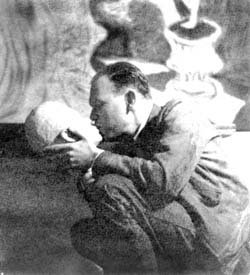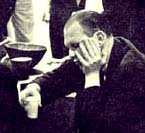|
Jack Spicer: You signal. You look to the third base side and see what they tell you to do, and then you signal what kind of pitch, and somebody, especially in Wrigley Field, is out in the scoreboard looking to see the signal, and they're signaling back at the batter.

Jack Spicer
photo from the collection of Lewis Ellingham and Kevin Killian
Q: There's a sort of manager and he has to listen to somebody else?
Jack Spicer: No, the catcher usually tells the pitcher what to pitch and the pitcher will throw off the sign then. I didn't read that "who stole the signs" thing in The Heads of the Town, but essentially the business is that the catcher signals to the pitcher, like, "I would like you to throw an outside fast ball there." You have him 0 and 2 and an outside fast ball he sometimes swings on. So he does something like this with his hands and the pitcher then will go like this, to shake off the sign, and then you give the second thing that you'd like him to do if he doesn't pitch an outside fast ball. And finally, you find, after he's shaken off three or four signs, that he just wants a fast ball to the plate, and so you give him the sign for that, and the guy hits a home run.
There are some batters like Mays, the catcher doesn't ever say anything about. You just let the pitcher figure out what the hell he should do for Mays because nobody can figure out Mays. But you have a rookie, or even somebody two, three years - say, Jim Ray Hart, a very good example of the Giants - the catcher knows how to pitch for him much better than the pitcher knows and he'll give the sucker pitches for him. For someone like Mays or Ernie Banks, there's no sucker pitch. Either they're in a slump or they aren't, and it doesn't really matter what the hell you do. You might just as well let the pitcher figure the thing out.
Q: The time in the poem, where the batter and the pitcher both knew what the ball was going to do . . .
Jack Spicer: Spahn and the catcher, yeah.
Q: You work towards that?
Jack Spicer: No. It's the kind of thing which happens with age. I think Spahn and the catcher, who is probably Jim Hegan of Cleveland, according at least to Warren . . . wasn't it Jim Hegan?
WT: Hegan, it was.
Jack Spicer: Yeah, who must be dead, because he wouldn't appear in the poem otherwise.
Well, the thing is that after a certain amount of time, you know and life knows what the hell is going to happen pretty much. You can't tell individually the exact second, but Spahn knows when he throws the pitch at you, and you know whether you can hit it or not, and Spahn fools around, you fool around, and you hit three home runs off of him. And you probably don't win any games by doing it, on account of the fact that Spahn pitches you those fast balls at a time when it wouldn't make any difference whether you hit a home run or not. This is getting old.
Q: That's politics.
Jack Spicer: Yeah, it is.
Q: You don't think the poets ever throw away their masks and their bats and go do something else?
Jack Spicer: Well, Rimbaud did. And then came back.
Q: Are you afraid of doing this?
Jack Spicer: Oh, shit, I'm so old that Rimbaud already died before I was my age. In Marseilles, with a vision.
No, I don't see any point in throwing the bats away particularly. You can sure get pissed off at ways of you striking out, or hitting home runs against a bad opposition, stuff like that.
Q: But you're a poet because you do funny things with bats.
Jack Spicer: I think our baseball thing has gotten all confused.
Dorothy Livesay: Basically, we don't know anything about baseball.
Q: How long do you think it will take to finish that poem, Jack?

The Tallman's house in Vancouver, where this lecture was held, in the front right downstairs room.
photo copyright © George
Bowering 1998, 1999
Jack Spicer: As I say, I think it's about half over, so this is just a real prediction which will probably foul up the prediction coming true, but I'd say off-hand from my previous experience, November. But I don't know. I've got stuck on this oil slick right now, and I don't know where to go. And furthermore, I don't want to leave Vancouver. There's that to it - the business of really not wanting to go back to Berkeley and San Francisco, wanting to stay here and not being able to. There's that thing, which gets in the way of any poems which are aimed toward me. It's going to be a rough few months, and I have no idea what will happen to the poems in this time.(See note 2)
Q: Are you actually going through a transition in your writing?
Jack Spicer: I'm going through a transition. In fact, I don't have no job, and I . . .
Q: No, I mean in your actual writing.
Jack Spicer: Well, if the radio set has three batteries which are gone and one that's still left, that isn't a transition in the radio broadcast. It's a transition in the radio set, namely that you don't have very much power. And these things that happen to you in life are like that. If you're only going on one transistor and you're a four-transistor radio, you're not going to be able to get in the outlying stations very easy. KFI doesn't come in.
Q: How long ago did you write the poem that you read on Sunday night?
Jack Spicer: Was that The Grail?
Ellen Tallman: No, Heads of the Town.
Jack Spicer: Oh, Heads of the Town. I would say that the "Textbook" was written in '62, maybe early '63, something like that.(See note 3)
Q: That was more assumptions and ideas, and the poetry that you read today seemed to be on concrete hooks. For instance, the image of the oil slick.
Jack Spicer: Or the image of the hook, if you remember the line.
Q: Well, I didn't intend to make that reference. See, that's the problem - every time you mention something, you've got it in a poem somewhere.
Jack Spicer: Nice thing about poems, I guess. It scares the shit out of me, too.
DL: It seems to me a different kind of poem from the others. I couldn't get with this the way I was with the others. That may be because a lot of the references are quite alien.
Q: I didn't mean to make it a point of weakness. I'm just wondering whether you're actually in your own mind when you're going through a change of personality or a change of outlook or whatever.
|
|

